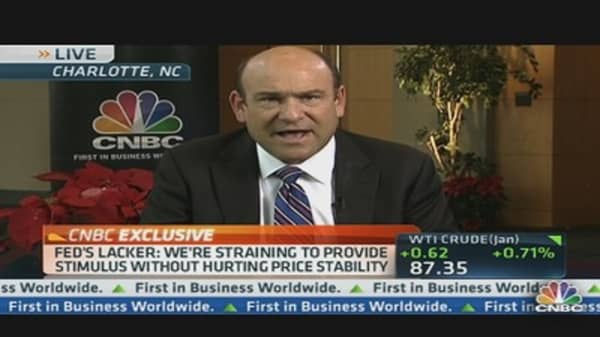This morning's
interview with Richmond Federal Reserve President Jeffrey Lacker
, the only Fed member to oppose the new numerical targets for unemployment and inflation, may actually be the most dovish statement we've heard out of the Fed yet.
Lacker made it clear that although he disagrees with the policy of
setting numerical targets
, the
Federal Reserve's Open Market Committee
as a body is "straining to provide as much stimulus as possible without endangering our price stability credibility."
Those words — "straining to provide as much stimulus as possible" — are pretty stark contrasts to the anodyne phrases we usually hear in connection with monetary policy. This is made all the more dramatic because Lacker is not describing his preferred policy. He's not engaging in wishful thinking, describing his own preferred path as the likely path.
"My worry, and the reason I dissented on this and the asset purchases, is that we seem to be willing to test the very limits of that credibility. And when you make a test, sometimes it doesn't come out right," Lacker said.
We're used to monetary policy hawks warning about the dangers of inflation. That's what monetary policy hawks do. But we typically interpret hawkish warnings from FOMC members as signs that rates might raise before we expect them to. We see them as advocates of a position, and try to judge how effective they may be at persuading other members to take their point of view.
Lacker, however, is doing something quite different here. He appears resigned to having lost out on the argument about numerical targeting. In his interpretation, the FOMC is going to do it. So he is warning that rates may stay low for long enough that inflation gets away from the Fed.
In other words, he's coming very close to forecasting higher inflation with lower rates. Far from undermining Fed policy, however, Lacker is really supporting it.
Folks like Paul Krugman have long argued that that central banks can "gain traction even in a liquidity trap if they can create expectations that money will remain loose after the economy recovers, generating modestly higher inflation."
In other words, the Fed need to communicate that it is willing to risk pushing things "too far." That it is planning on "testing the very limits," as Lacker says.
That pretty much seems to be Lacker's message, although he's clearly not happy about it. Chalk Lacker up as an accidental supporter of Krugman's view of central banking.
Follow me on Twitter @Carney




